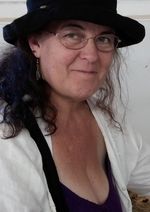Frederick Douglass, Ken Brown & Me

Not long ago I watched a television show about the life of Frederick Douglass. He was the African-American who was born a slave but who worked his entire life as an abolitionist and black emancipator. I watched the show to pay my respects, so to speak. Many years before, my 7th grade history teacher, Mr. Bill, at Lincoln Junior High School, Skokie Illinois, asked me to do a report about Frederick Douglass. I think it was the year 1967.
At the time of the assignment, I froze inside. I think I was the only person in the class who was assigned to do a report about a black historical figure. This school had no black students that I can recall. I was a minority student of another ilk, an Irish Catholic among Jews, but that's another story.
I remember going to the library and looking up Frederick Douglass. What a fierce face! That wild hair, that hatchet blade of a nose. I thought he looked like a black Beethoven! Put a head- dress on him and he'd look like an Indian Chief!
I don't remember much about the report I wrote except that I felt embarrassed to give it. In my school there was no awareness of the black experience. My life was totally removed from the reality of Frederick Douglass's life, and from the life of black Americans.
As a child I had lived in the beautiful dairy country of upstate New York. There were no black people where I lived, except the dirt-poor migrant workers who traveled through the area every summer. They worked for the local farmers harvesting crops. Their diction was terrible, they smelled funny and they lived in horrid little shacks near the crops they picked.
In the third grade, there was an empty desk next to mine. One day, Mrs. Metcalf led a little, poorly dressed black boy into our all white class. She introduced him saying, "This is Ken Brown."
Suddenly I realized he was going to be seated next to me. I made a face at the teacher as if to say, "Yuck, I don't want that dirty looking kid sitting next to me." The teacher looked at me angrily, looking very displeased with my reaction. I am sure she felt sympathetic toward him. Ken sat down, looking neither left nor right, while my girlfriends laughed and I tried to move as far away from him as possible.
When I look back over my life, that incident is one of the things that I did that I am most ashamed of. I think of this poor, innocent boy, subjected to the ignorant and cruel snickering of children who had no idea how mean and stupid they were being.
Later on the playground I saw Jeff Candage, a white boy from another class, hanging out with Julian, another black child of a migrant worker family. I remember asking Jeff why he was friends with Julian. Jeff defended Julian and said something like, "Why not? He's the same as us."
It was as if a light went on in my head. I knew Jeff spoke the simple truth. I was really impressed with Jeff's righteousness. With the emergence of civil rights and the change in cultural awareness during the past 30 years, that might not like seem like such a revelation. However, at the time, it made a deep impression. I don't know why Jeff was able to think and feel differently than the way the rest of us seemed to, but I distinctly recall feeling ashamed of myself and I was humbled in the face of truth. I don't think I had any huge revelation and I don't remember trying to be friendly to Ken after that, but I never forgot the incident.
But I have cried many repentful tears in my life thinking about that incident in the classroom.
I watched the program about Frederick Douglass with reverence and respect to educate myself and maybe make up a little bit for my childhood immaturity.
My prayer is to meet Ken Brown again someday. I'd like to look in his eyes, hug him and say "I'm so sorry. I really didn't know what I was doing." Maybe that heart could be part of the foundation for the healing between black and white. Maybe someone who was mistreated in their life by someone like me could be healed a little bit, knowing that such actions often bring remorse later. I know that even if I never meet Ken again directly, that I can contribute to the reconciliation of love between all races of people.
I would hope that Frederick Douglass himself would be comforted too. I hope he knows that his efforts were not in vain. Even though sometimes the black-white gap seems irreparable, I believe that as long as there are people who want to continue to extend toward others with love, that one day all wounds will be healed.
Kim lives in Maine, which is lovely, and where she continues her enthusiastic relationship with Art, Music, Nature, Books, Animals, Humor and Trees.


